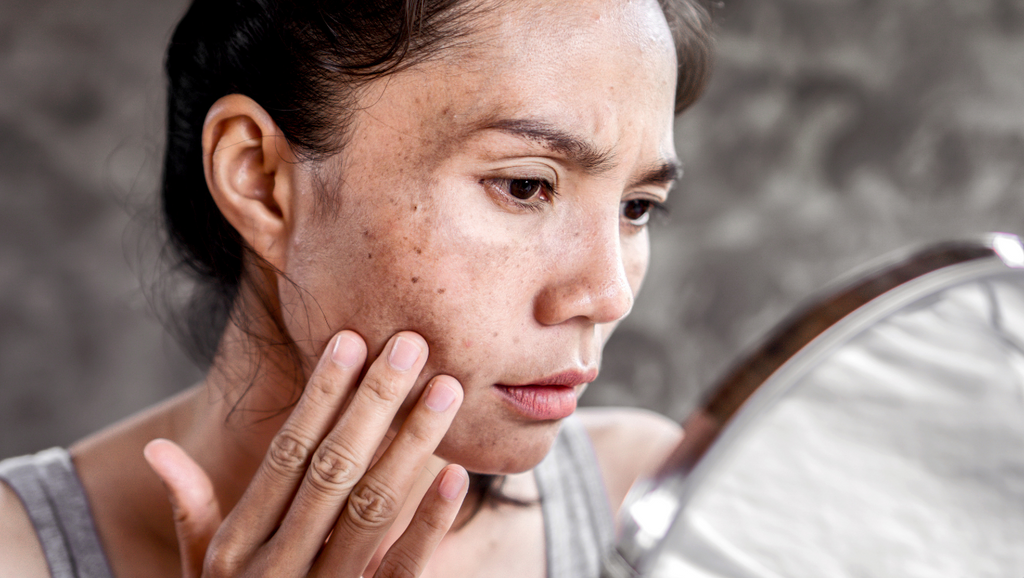THE Dynamic Duo of Skincare, Vitamin C and Retinol—Can they be used together?
Two of the most researched skincare ingredients that have gained significant popularity are without a doubt Vitamin C and Retinol. These skincare powerhouses offer a myriad of benefits, but one question we get asked all the time, is should you use them together? Let’s dive in to find out.

In this blog, we will review the benefits of combining vitamin c and retinol for all types of skincare concerns along with insight on usage, what to avoid, and our favorite Apoterra pairings.
IN THIS POST:
Understanding Topicals: Vitamin C and Retinol

Vitamin C and Retinol are two of the most sought after ingredients in skincare. Before you decide to use them both, it’s important to understand what Vitamin C and Retinol can do individually.
Vitamin C: Vitamin C is a potent antioxidant that offers a range of benefits for the skin. Benefits include:
- Aids in collagen production
- Helps to maintain skin's elasticity and firmness
- Helps neutralize free radicals caused by UV exposure and pollution, which helps protect the skin from premature aging and oxidative stress.
- Provides brightening properties also make it an excellent choice for reducing the appearance of dark spots and hyperpigmentation.
When to use: The use of topical Vitamin C is encouraged for both morning and evening routines, however, with the antioxidant properties that can support the skin from environmental stressors, we suggest starting use during the daytime.
Important to note: Not all vitamin C’s are created equal! In fact, there are many forms commonly used in skincare such as:
- ascorbic acid
- sodium ascorbyl phosphate
- ascorbyl palmitate
- tetrahexyldecyl ascorbate
- magnesium ascorbic phosphate
A key difference to note about different forms of Vitamin C includes its pH compatibility with other ingredients, including niacinamide and retinol.
Apoterra uses a vegan, oil soluble and stable version of Vitamin C called ascorbyl palmitate in the vitamin C regenerative balm. This form is readily absorbed into the skin to immediately deliver the multiple benefits of this vitamin deep within the skin. What you get are potent antioxidant activities that can also help improve elasticity by promoting collagen production. Other Vitamin C benefits for skin are helping to fade discoloration and reduce inflammation for a clearer, brighter complexion.
AND
Sodium Ascorbyl Phosphate (Vitamin C) in the Neroli Clarifying Complexion mist which is a stable, water-soluble derivative of Vitamin C that does not oxidize easily. When applied to the skin, Sodium ascorbyl phosphate (SAP, for short) reacts with enzymes in the skin and turns into ascorbic acid. For this reason, just like pure vitamin C, SAP functions as an antioxidant and can have brightening, wrinkle-smoothing, skin-firming and clarifying properties.
Now let’s explore Retinol!

Retinol: A derivative of Vitamin A, retinol is a well-regarded ingredient in the realm of anti-aging skincare. Benefits include:
- Stimulates cell turnover
- Encourages the shedding of dead skin cells
- Promotes the growth of new, healthy cells. This process can help smooth out fine lines and wrinkles, reduce the appearance of acne scars, and improve overall skin texture.
- Retinol is also known to unclog pores, making it an effective tool in managing acne-prone skin.
Important to note: Retinol can create photosensitivity in the skin so it is best to use only during night time routines with the use of SPF during the day. It is also not recommended for those who are pregnant or breastfeeding.
Are all vitamin A derived ingredients the same? Quick answer - no, they are not. Though they may have similar benefits, they range in efficacy and compatibility with other ingredients such as Vitamin C.
There are actually many different derivatives commonly found in skincare products along with some that are strictly prescription based. Here are some examples of different forms of vitamin A in skincare.
- Retinoid
- Tretinoin
- Retin-A
- Retinyl palmitate
- Retinyl aldehyde
- Retinal aldehyde
- Retinol*
- Retinoic acid
- Retinyl linoleate
- Retinyl propionate
- Retinyl acetate
For the purpose of this article, we will be referencing to retinol as it is the most commonly used form of vitamin A in skincare to date
Better together - Benefits of using both Vitamin C and Retinol for different skin concerns

As suspected, the combination of Vitamin C and Retinol in a skincare routine can yield even more remarkable results. Vitamin C can enhance the efficacy of Retinol by promoting collagen production and providing antioxidant protection, reducing the potential irritation often associated with Retinol use.
To effectively incorporate vitamin C and retinol into your skin routine, follow these guidelines:
- Try A Patch Test: Perform a patch test before applying Vitamin C and Retinol to your entire face to ensure your skin can tolerate them without adverse reactions.
- Start With Alternate Usage: Consider starting to use Vitamin C and Retinol on alternate days to avoid overloading your skin. This can provide the benefits of both ingredients while minimizing potential irritation.
- Choose Gentle Formulations: Look for products that are formulated for sensitive skin and free from potential irritants, such as fragrance and harsh additives. If retinol seems to be too strong for your skin, consider a retinol alternative or vitamin a derivative, retinal (aka retinaldehyde). Pairing your retinol of choice with an Apoterra Vitamin C product such as the Vitamin C regenerative balm and/or Neroli Clarifying Complexion Mist is a great first step.
- Add Daily Sun Protection: Apply broad-spectrum sunscreen daily, as both Vitamin C and Retinol together can increase sensitivity to the sun.
This comprehensive approach of using Vitamin C and Retinol can lead to more noticeable and lasting improvements. Let’s explore the different benefits for common skin concerns.

VITAMIN C AND RETINOL BENEFITS FOR ACNE:
- Exfoliation and Cell Turnover: Retinol promotes cell turnover, which can help prevent clogged pores and reduce the formation of comedones (blackheads and whiteheads). By preventing dead skin cells from accumulating, retinol can contribute to a clearer complexion.
- Unclogging Pores: Retinol's exfoliating properties can help unclog pores, reducing the likelihood of breakouts and minimizing the appearance of existing blemishes.
- Reduced Inflammation: Vitamin C's anti-inflammatory properties can help calm and soothe inflamed skin, reducing redness and irritation associated with acne.
- Prevention of Further Breakouts: By addressing clogged pores, inflammation, and post-acne pigmentation, retinol and vitamin C can help prevent new breakouts from forming.
- Oil Regulation: Retinol can help regulate sebum production, which can be beneficial for individuals with oily or acne-prone skin.
Remember that individual responses to skincare products can vary. If you experience persistent irritation or worsening of your acne, it's best to discontinue use and seek advice from a skincare professional. Consistency and patience are key when using these ingredients to address acne concerns.
VITAMIN C AND RETINOL BENEFITS for FINE LINES AND WRINKLES:
- Collagen Production: Retinol stimulates collagen synthesis, helping to improve skin elasticity, firmness, and overall texture. Vitamin C also supports collagen production and helps maintain the structural integrity of the skin.
- Wrinkle Reduction: Retinol helps to minimize the appearance of fine lines and wrinkles by promoting cell turnover and encouraging the growth of new skin cells. Vitamin C's antioxidant properties protect the skin from further damage and support a smoother complexion.
- Antioxidant Protection: Vitamin C is a powerful antioxidant that helps protect the skin from environmental stressors and pollutants, which can contribute to premature aging.
- Texture Improvement: The combined use of retinol and vitamin C can result in smoother, more refined skin texture, reducing the appearance of roughness and unevenness.
- Enhanced Absorption: Vitamin C can enhance the absorption of retinol, potentially making it more effective when used together.
VITAMIN C AND RETINOL BENEFITS FOR HYPERPIGMENTATION:
- Brightening and Even Skin Tone: Vitamin C is well-known for its ability to inhibit melanin production, the pigment responsible for dark spots and hyperpigmentation. It can help fade existing dark spots and prevent new ones from forming, leading to a more even and radiant skin tone.
- Combating Sun Damage: Both vitamin C and retinol contribute to repairing sun damage, which is a common cause of hyperpigmentation. Vitamin C can mitigate UV-induced damage, while retinol supports the skin's natural repair processes.
- Long-Term Results: The consistent use of vitamin C and retinol can lead to gradual and sustainable improvements in hyperpigmentation over time. Patience and consistent application are key.
VITAMIN C AND RETINOL BENEFITS FOR SENSITIVE SKIN:
Sensitive skin requires extra care and caution when introducing new skincare ingredients such as Vitamin C and Retinol. When used properly, Vitamin C and Retinol can help address skincare concerns while being gentle on sensitive skin. Here are the benefits:
- Reduced Irritation Risk: When using Vitamin C and Retinol together, vitamin C can potentially help mitigate some of the irritation that retinol may cause in sensitive skin. Vitamin C's anti-inflammatory properties can contribute to a calmer complexion.
- Enhanced Skin Barrier: Both Vitamin C and Retinol can contribute to improving the skin's natural barrier function, which is important for maintaining healthy, resilient skin, especially for those with sensitive skin.
- Reduced Redness: The combination of Vitamin C and Retinol may help reduce redness and inflammation, contributing to an overall more even skin tone.
When to avoid using Vitamin C and Retinol

While Vitamin C and Retinol offer numerous benefits, there are some potential risks to be aware of:
- Overuse: Both ingredients can cause irritation, redness, and peeling if used excessively. Starting with lower concentrations or pH compatible variations of Vitamin C and Retinol while gradually increasing usage as your skin builds tolerance.
- Combining Too Soon: Introducing Vitamin C and Retinol simultaneously can overwhelm the skin, leading to irritation. Start by using them on alternate days to allow your skin to adjust.
- Incompatibility with Certain Ingredients: Some forms of Vitamin C can be acidic, and using it with certain ingredients like niacinamide (we discuss this in another blog) may lead to reduced efficacy.
- Sun Sensitivity: Both ingredients can increase sun sensitivity. Always use a broad-spectrum sunscreen with at least SPF 30 during the day when using Vitamin C and Retinol.
- Contraindication to Pregnancy: Retinol and other forms of vitamin A, such as retinoids are to be avoided during pregnancy.
To effectively incorporate Vitamin C and Retinol into your skin routine, consider our recommendations for best Vitamin C and Retinol pairings using Apoterra Skincare.
Here’s what an Apoterra Skin Pro says about the difference in combining Vitamin C and Retinol while using Apoterra skincare compared to other formulations:
Best Apoterra Vitamin C and Retinol pairings
When using vitamin C, it's important to choose a stable formulation that won't oxidize easily.
“Our Neroli Mist and Vitamin C Balm don't have this issue though! The Neroli Mist has a pH of 5.5 and is made with a less acidic form of Vitamin C called Sodium Ascorbyl Phosphate…”

“...Our Vitamin C Balm is waterless and is made with Ascorbyl Palmitate, a stable oil-soluble form of vitamin C.
Both products are also soothing—not really a risk for added irritation.” - Dominique Caron, Founder and Formulator of Apoterra
Remember that both Vitamin C and Retinol can take time to show noticeable improvements. Results might not be immediate, and consistency is key. If you're using other acne treatments or medications, consult with a dermatologist before incorporating Vitamin C and Retinol into your routine to ensure they don't interact negatively.
Conclusion:
Incorporating Vitamin C and Retinol into your skincare routine can yield remarkable results when used wisely. Vitamin C and Retinol offer an array of benefits, from brightening and evening out skin tone to reducing the signs of aging and improving texture.
By understanding their individual benefits, knowing who they work for, and being aware of potential pitfalls, you can harness the power of the dynamic duo of Vitamin C and Retinol for radiant and healthy skin. As with any skincare regimen, it's advisable to consult with a dermatologist to tailor the routine to your specific needs and concerns.
Have more questions? Drop them in the comments!
Research:
https://www.ncbi.nlm.nih.gov/pmc/articles/PMC2699641/
https://pubmed.ncbi.nlm.nih.gov/15767769/
https://pubmed.ncbi.nlm.nih.gov/30674002/
https://www.ncbi.nlm.nih.gov/pmc/articles/PMC2945860/
1 comment
Do you have a specific brand of retinol suggestion?



